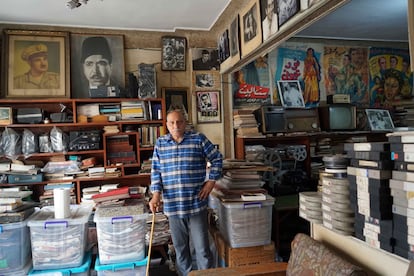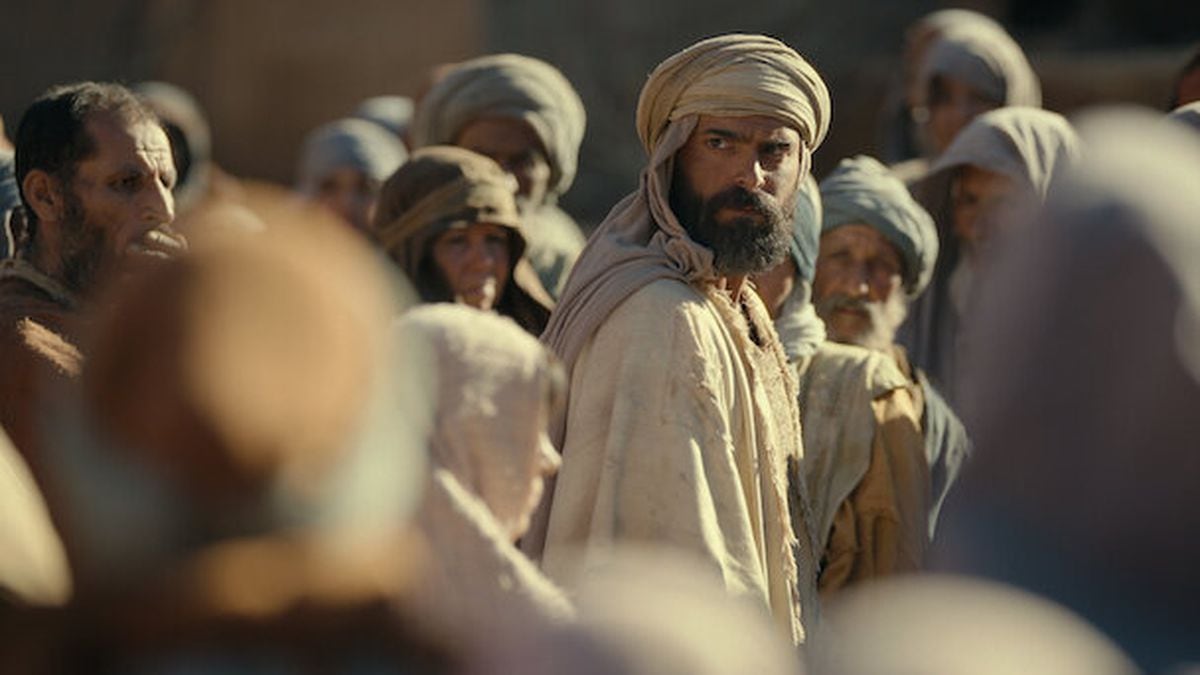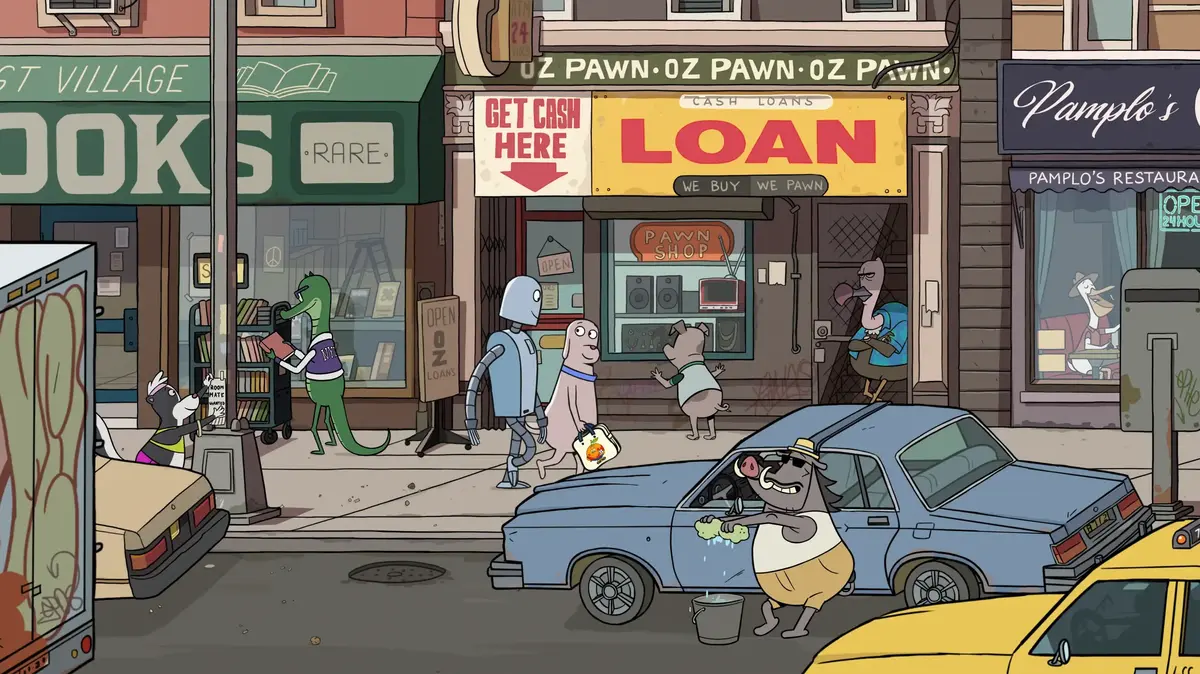Makram Salama's modest apartment, located in an Alexandria building a short distance from the sea, could easily pass for an antiques dealer in full swing.
The entrance is crammed with boxes overflowing with papers, the walls are lined with colorful posters and black and white photographs, half of its narrow corridor is occupied by shelves with rollers and more boxes, and there is hardly any space left on the armchairs in the living room. To sit down.
Born in 1946 in southern Egypt, Salama always worked as a freight forwarder on the Suez Canal, but it was in his native Qena, now 50 years ago, that he bought his first Egyptian film poster. That was when he embarked on the other great adventure of his life: collecting everything that had to do with the cinema of his country. Today, the Egyptian has turned his house into a cinematographic sanctuary, in which he keeps thousands of slides, images and movie posters, some from the 1930s, some 30,000 industry documents, nearly 50 projectors and what he considers the jewel in the crown: some 100,000 negatives that immortalize an extraordinary time in the history of Egypt.
“In the fifties, sixties and seventies the country was something else. Egypt was something else. Right now the country has a past and no present”, evokes, nostalgic, Salama. “For example, we have 5,000 negatives of Alexandria in the summer of the 1950s and 1960s,” he says, “and when you look at those images and look at the situation we find ourselves in now,” he slides, “it's like from heaven to earth; from heaven to earth".
It was precisely in a hall of the former Tousson Pasha Stock Exchange in Alexandria, one afternoon in November 1896, that the first film in Egypt, produced by the Lumière brothers and released in Paris only a few months before, was shown.
An anonymous writer then revealed in a local newspaper that he had been "intoxicated" by the wonders he had seen, in a text entitled
When will we reach them?
, referring to the French.
Time showed him that it would be quick.
Only a year after that projection, the first cinema in Egypt was opened in Alexandria, and the Lumière company began recording that same course the first films of Egyptian landscapes, starting with the city's Plaza de los Consuls, he says. Nancy Ali, Scholar in Collective Memory.
Ali considers, however, that the true beginning of Egyptian cinema was marked
by In the Land of Tutankhamun
, the first feature film shot by an Egyptian, Mohamed Bayomi, in 1923, since until then the industry was mainly aimed at colonizers.
In the 1930s, Egyptian cinema recorded other notable milestones, such as its first feature film with sound,
Children of the Aristocrats
, and its first musical,
Ode of the Heart
.
Images of Egyptian films that Makram Salama keeps in his apartment in Alexandria. Marc Español
The ground was ready for its golden age to flourish between the 1940s and 1960s, during which the industry, famous for its musicals, melodramas and comedies, established itself as the most important in the Middle East, attracting actors, producers, and cameramen. from the entire region. “Cairo was considered the Hollywood of the East, not only because it was a cultural center but because our films were on par with those of Hollywood and the world,” says Ali.
For many, that time was a thing of the past when, in the wake of the 1967 Six-Day War between Israel and a coalition of Arab countries that included Egypt, the country's film industry underwent a profound change, marked by less movies and resources, says Yasmin Desouki, film archivist. But many others, he points out, consider that the productions of the seventies and eighties were, if possible, of greater importance: with an excellent artistic and narrative level, and adventurous filmmakers and actors who produced films that deeply connected with the public.
Today, however, most of the productions of those glorious years are irreparably damaged, abroad or have been lost track of. Despite the immense value and deep roots of the film industry in Egypt, there is no established tradition of archiving and preservation in the country, so this mission has been relegated to individual initiatives that try to save part of that legacy.
“The loss is tremendous,” says Desouki, a collections manager at the Chicago Film Archives and a former director of archives at the Egyptian film company Misr International Films. “Relying on digital copies that circulate on YouTube creates in many ways a misunderstanding of history, he adds, “cultural memory is fragmented, few things can compensate for the physical absence of archival work.”
Hidden in a worn building in the middle of a lively Alexandria market near the old Plaza de los Consuls, the Behna studios are another initiative that tries to preserve part of that cinematographic legacy. Founded by four brothers from Aleppo, Behna Films was one of the largest film companies in Egypt in the first half of the last century, with offices in Cairo, Baghdad, Khartoum, Beirut and Damascus.
Today one of his heirs, Basile Behna, who recovered the company just a decade ago after being nationalized in the 1960s, is focused on putting order and documenting all his belongings, including hundreds of documents, photos and posters, and they are pending to find financing to start a digitization project. "I think for us, for Egypt, it is very important, because we don't have a preservation system like Europe," says Behna in her Alexandrian apartment.
Yasmine Hussein, who is in charge of the archives, believes that the archives are important for artistic and sociological reasons.
"From the documents, we can work on the history of Egyptian society and cinema, such as who was the audience or what was suitable," he observes.
"Also for the history of women, because women worked with Behna as actresses and producers," she adds, "and when the State in the sixties enters into distribution and production, all of a sudden they begin to disappear."
Makram Salama, surrounded by old material from Egyptian cinema.Marc Español
In the center of Cairo, in a building in the shadow of the centuries-old Shaar Hashomayim synagogue, Egypt's Cimatheque has another of the most valuable film archives in the country and aims to become the archive of reference.
"It tries to be an alternative cinema space that, through projections and revisions of the moving image, makes us rethink history," says Ali Atef, the director of its archives.
The Cimatheque archive is being built on the basis of donations, and at the moment it has six large collections of figures from the film industry, covering mainly from the 1950s to the 1980s.
All in all, the project preserves numerous newspapers, gazettes, news reels, and more than 2,000 films.
One of the most complete collections they have is that of a renowned critic named Abdel Hamid Said, explains Atef. They keep everything from him: books, censor reports, notes, reviews and magazines. "You can think of it as the life of a movie," notes Atef, "it gives a good context for the film culture that existed at the time."
More information
The movie that lit Egypt
Despite the efforts of these spaces, the feeling is that, in terms of preserving film heritage, their capabilities are limited, but Desouki notes that they are just as essential. “They bring a lot to the conversation. Any attempt to raise awareness of the importance of archiving and conservation is important, even if the attempts seem modest or incomplete,” he notes.
Back in Alexandria, Makram laments the lack of interest in the country even to take over and keep, at least, what he has accumulated.
Older and with two children abroad, the Egyptian wants to sell everything, but with the only condition —and this is where the offers fall— that he stays in Egypt.
“Me and my wife are now alone.
What are we going to do with all this?
The country does not want anything,” he maintains.
“[And abroad] I can't.
Money will give me money.
But where will all this go?
That is the question,” he continues.
“For me it is a treasure”.









